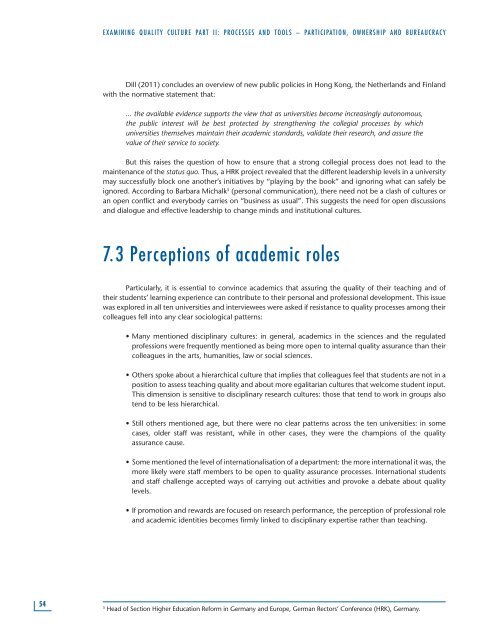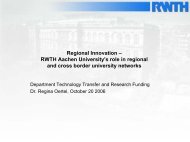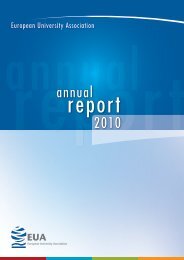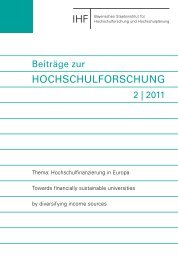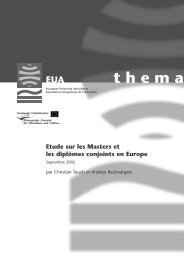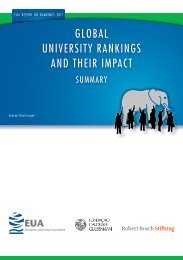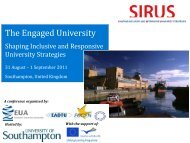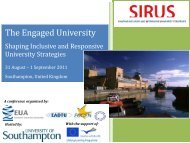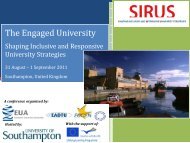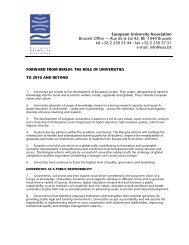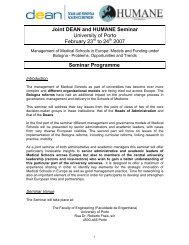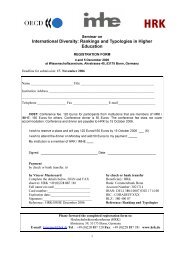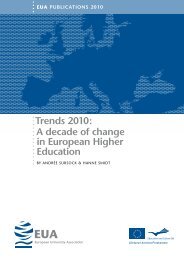Examining Quality Culture Part II: - European University Association
Examining Quality Culture Part II: - European University Association
Examining Quality Culture Part II: - European University Association
You also want an ePaper? Increase the reach of your titles
YUMPU automatically turns print PDFs into web optimized ePapers that Google loves.
ExAmININg QUALITy CULTUrE PArT <strong>II</strong>: PrOCESSES ANd TOOLS – PArTICIPATION, OwNErShIP ANd BUrEAUCrACy<br />
Dill (2011) concludes an overview of new public policies in Hong Kong, the Netherlands and Finland<br />
with the normative statement that:<br />
... the available evidence supports the view that as universities become increasingly autonomous,<br />
the public interest will be best protected by strengthening the collegial processes by which<br />
universities themselves maintain their academic standards, validate their research, and assure the<br />
value of their service to society.<br />
But this raises the question of how to ensure that a strong collegial process does not lead to the<br />
maintenance of the status quo. Thus, a HRK project revealed that the different leadership levels in a university<br />
may successfully block one another’s initiatives by “playing by the book” and ignoring what can safely be<br />
ignored. According to Barbara Michalk 5 (personal communication), there need not be a clash of cultures or<br />
an open conflict and everybody carries on “business as usual”. This suggests the need for open discussions<br />
and dialogue and effective leadership to change minds and institutional cultures.<br />
7.3 Perceptions of academic roles<br />
<strong>Part</strong>icularly, it is essential to convince academics that assuring the quality of their teaching and of<br />
their students’ learning experience can contribute to their personal and professional development. This issue<br />
was explored in all ten universities and interviewees were asked if resistance to quality processes among their<br />
colleagues fell into any clear sociological patterns:<br />
• Many mentioned disciplinary cultures: in general, academics in the sciences and the regulated<br />
professions were frequently mentioned as being more open to internal quality assurance than their<br />
colleagues in the arts, humanities, law or social sciences.<br />
• Others spoke about a hierarchical culture that implies that colleagues feel that students are not in a<br />
position to assess teaching quality and about more egalitarian cultures that welcome student input.<br />
This dimension is sensitive to disciplinary research cultures: those that tend to work in groups also<br />
tend to be less hierarchical.<br />
• Still others mentioned age, but there were no clear patterns across the ten universities: in some<br />
cases, older staff was resistant, while in other cases, they were the champions of the quality<br />
assurance cause.<br />
• Some mentioned the level of internationalisation of a department: the more international it was, the<br />
more likely were staff members to be open to quality assurance processes. International students<br />
and staff challenge accepted ways of carrying out activities and provoke a debate about quality<br />
levels.<br />
• If promotion and rewards are focused on research performance, the perception of professional role<br />
and academic identities becomes firmly linked to disciplinary expertise rather than teaching.<br />
54 5 Head of Section Higher Education Reform in Germany and Europe, German Rectors’ Conference (HRK), Germany.


